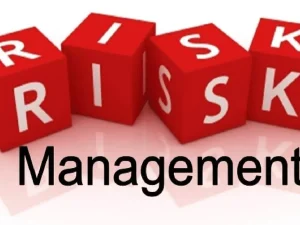No.1 Best Supply Chain Risk Management Training In Nigeria
- Description
- Curriculum
- Reviews

In today’s dynamic global marketplace, supply chain risks can arise from multiple sources—disruptions in logistics, regulatory changes, geopolitical instability, natural disasters, and even cybersecurity threats. Effective risk management is essential for ensuring continuity, efficiency, and profitability in any organization. Our Supply Chain Risk Management Training is designed to equip professionals with the necessary skills and knowledge to identify, assess, and mitigate risks within supply chains.
This supply chain risk management course provides in-depth insights into the complexities of supply chain operations and offers practical strategies for risk mitigation. From logistics and inventory management to supplier relationships and contingency planning, participants will master the critical components of supply chain risk management. By obtaining this supply chain risk management training, you will gain a competitive edge in the industry, positioning yourself as a critical asset capable of safeguarding an organization’s supply chain operations against unforeseen disruptions.
Course Objectives:
At the end of the supply chain risk management course, participants will:
- Acquire advanced skills in identifying, assessing, and mitigating risks within the supply chain to ensure smoother operations and prevent disruptions.
- Learn best practices to navigate regulatory requirements and create risk mitigation strategies that align with business continuity plans.
- Learn to apply tools and frameworks to reduce operational costs, improve supply chain efficiency, and enhance risk management capabilities within their organization.
- Be equipped with the necessary knowledge to handle complex global supply chain risks such as geopolitical instability, environmental disasters, and cyber threats.
What is Supply Chain Risk Management?
Supply Chain Risk Management (SCRM) refers to the process of identifying, analyzing, and mitigating the risks associated with supply chain operations. These risks can be physical, such as natural disasters, or operational, like disruptions in logistics. The goal of Supply chain risk management is to ensure that a supply chain remains resilient and can continue functioning despite these challenges.
This supply chain risk management training focuses on helping professionals develop proactive strategies to manage and mitigate risks. Through comprehensive risk assessments and contingency planning, supply chain managers can ensure that their organizations are prepared to handle potential disruptions without significantly affecting business operations. This supply chain risk management training is ideal for supply chain managers, procurement officers, logistics coordinators, and anyone involved in operations management who is looking to sharpen their skills in risk assessment and mitigation.
Why Choose Our Supply Chain Risk Management Training?
Our Supply Chain Risk Management Training is designed to offer a comprehensive learning experience that blends theoretical knowledge with practical application. Participants will benefit from expert instructors with deep industry knowledge, hands-on exercises, and access to a community of supply chain professionals. Here’s what sets this supply chain risk management training apart:
- – Industry-focused curriculum: The supply chain risk management course content is tailored to the unique challenges and opportunities of the modern supply chain landscape, with a special focus on risk management.
- – Real-world case studies: Learn from real-world examples of how organizations have successfully mitigated supply chain risks and overcome disruptions.
- – Flexible learning options: Whether you prefer in-person workshops or online classes, our training program offers flexible learning formats to suit your schedule and learning style.
Who Should Attend This Supply Chain Risk Management Course?
This supply chain risk management training is ideal for:
- – Supply Chain Managers looking to enhance their risk management capabilities.
- – Procurement Officers who want to better understand how to mitigate supplier risks.
- – Logistics Coordinators seeking to improve operational resilience.
- – Operations Managers interested in building more resilient supply chains.
- – Business Continuity Planners who need to incorporate supply chain risk management into their broader organizational strategies.
Don’t let supply chain disruptions derail your organization’s success. Enroll in our Supply Chain risk Management Training and gain the skills and knowledge needed to safeguard your operations from risks. Whether you’re dealing with natural disasters, market fluctuations, or supplier issues, this supply chain risk management course will prepare you to tackle any challenge with confidence. Position yourself as a leader in supply chain risk management and ensure the resilience of your organization’s supply chain.
-
1The 80:20 law of Supply Chain Management
-
2The Nature of Supply Chain Management
-
3The Supply Chain Management Procedure
-
4Project Appraisal and Analysis
-
5Types of Supply Chain Management Methods
-
6Sourcing and Types of Sourcing
-
7Supply Chain Integration Framework
-
8Customer Relationship Management
-
9Customer Service Management
-
10Demand Management
-
11Order Fulfillment
-
12Manufacturing Flow Management
-
13Supplier Relationship Management
-
14Product Development and Commercialization
-
15Returns Management
-
16Physical Logistics and Channel Management dynamics
-
17Route Configuration for Effective Distribution
-
18Physical Distribution Planning and Control Using SWOT Analysis
-
19Mastering the Art of Scheduling
-
20Schedule Control and Optimization Skills
-
21Understanding Material Requirements Planning vs. Enterprise Resource Planning (ERP)
-
22Inventory Management
-
23Intermodal Systems for All Modes of Transportation
-
24International Contract Terms (Transport Contracts Management)
-
25Physical Distribution Management
-
26Quality and Supply Chain Management
-
27Marketing Channels (Distribution Intermediaries)
-
28Strategic Insight into the Entire Market
-
29Logistics Network Designing for
-
30Developing a Lean Supply Chain Structure
-
31Global Supply Chain Operations
-
32Strategic Outsourcing
-
33Coordinating Capacity and Production Planning
-
34Supply Chain Total Cost (Physical Cost and Market Cost)
-
35Supply Chain Design and Planning
-
36Forward Integration vs. Backward Integration
-
37Narrow Span and Wide Span
-
38Supply Chain Configuration Techniques
-
39The Blue Ocean Strategy for Your Supply Chain (VIRN Analysis)
-
40Service Contracts Management
-
41Service Contracts Planning and Administration
-
42Nature of Inventory
-
43Factors Affecting Inventory
-
44Costs in Inventory
-
45Stock Classification
-
46Stock Evaluation
-
47Department of Inventory Management
-
48Functions of Inventory
-
49Selective Inventory Control
-
50Reorder Quantity Methods and EOQ (Economic Order Quantity)
-
51Reorder Time Methods






